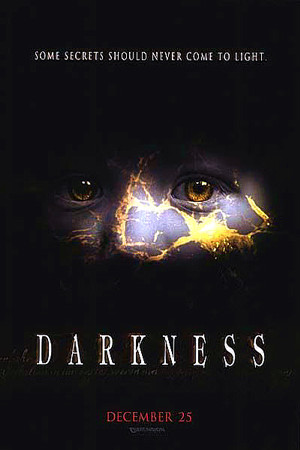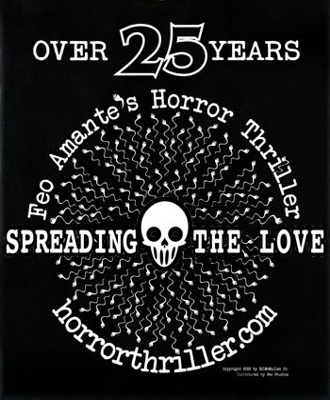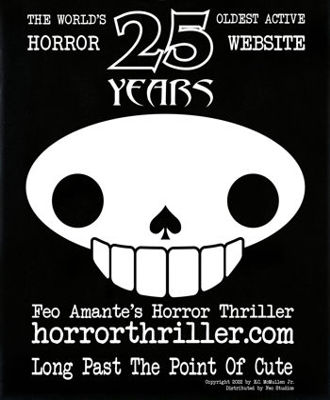 |
 |
Review by E.C. McMullen Jr. |
 DARKNESS- 2002USA Release: Dec. 25, 2004 Castelao Producciones S.A. / Dimension Films / Fantastic Factory / Vía Digital / Miramax Ratings: France: -12 / Sweden: 15 / U.K.: 18 / USA: R |
||
The credits roll over darkness and you hear a man questioning a boy. Newspaper clippings flash through the credits with headlines about some kind of ritual slaying. The man asks direct questions but the boy's answers are evasive. You see a boy running through the woods. You realize that the child isn't intentionally trying to dodge the questions, he's just traumatized and confused.
Then it's 40 years later.
You meet the new family of the house.
With cinematography by Xavi Giménez (INTACTO, LOS SIN NOMBRE, PALABRAS ENCADENADAS, THE MACHINIST), DARKNESS, true to its name, is visually dark throughout every frame.
Writer / Director Jaume Balagueró (Ramsey Campbell's LOS SIN NOMBRE) however must shoulder the blame for this, having instructed Xavi on how he wanted his movie to look. The entire movie looks dark. This is a bad precedent to set because, by the time the Darkness arrives - in the form of a much awaited eclipse, the audience is left wondering if the characters are in THE dark darkness. There is no shock of contrast. Even a housewarming party that's supposed to be outside in bright sunlight is in subdued tones.
Our heroine, so to speak, is Regina or Reggie for short (Anna Paquin: X-MEN). The big sister of the house, she moves among her parents with wary caution. That is because her Pop, Mark (Iain Glenn: PARANOID, TOMB RAIDER, RESIDENT EVIL: APOCALYPSE), has a condition that makes him prone to violence. Actor Glenn, who usually plays strong rogues or dashing hero types, does a great turn here as a weak and wimpy man. Mark is overwhelmed by mental demons and subdued by the medicine that keeps them at bay. Reggie's Mom, Maria (Lena Olin: THE NINTH GATE, QUEEN OF THE DAMNED, ALIAS [TV]), is also treated with distance because she lives in constant denial about Pop's attacks, even when he is laying in the hospital recovering from one.
Regina has also become a self-styled designated protector of her little brother Paul (Stephan Enquist), who is too young to remember Pop's first real bad attack and so is frightened when Pop suffers a relapse.
Scene after scene, the creeps and suspense in the movie builds in tiny increments. We see flashes of dark shadows moving past open doorways, silhouettes of gathered children waiting in dark rooms, just out of the light. At one point Pop loses it completely and first starts hacking into the wood panelling of the house, under the staircase, "Paul told me to do it," Pop says (Little Paul later denies it, thus revealing that Pop's violent dementia is returning).
Beneath the stairs, Pop finds a cache of stuff that would belong to a child. He also finds a creepy photograph that looks like it is out of the 1800s, but is later revealed to be from only 40 years ago. What gives? Who knows. By this time, all the new questions promise a whopping big payoff. But like much of this movie, nothing is ever explained.
Early on, through a series of flashbacks, we find that Pop is the child we heard, the seventh child that "got away". Funny how he wouldn't recognize the house that must surely haunt his dreams - but perhaps Pop has blocked that horrid memory from his mind. That said, even among people who block like that - all it takes is a mere image or sound or smell from their repressed memory to bring it all back, and Pop is given enough imagery to remember minutia!
Pop sees the house and is unphased.
Pop sees the creepy picture and falls in love with it.
As the movie explains it, it is not the terrible familiar house that is setting off Mark's attacks, but the darkness. So this plot hole is a bit deep. But there are an awful lot of plot holes throughout this flick.
Now I love movies that leave you with unanswered questions (DARK CITY), so long as they answer the main question or plot. And I love movies with endings that leave you hanging (JACOB'S LADDER), but that only works when there is enough in the story that, if you give it some thought, nearly everyone can arrive at the same conclusion because that vague ending was actually forewarned from throughout the earlier parts of the film. And I'm crazy about movies that leave the survival of the characters open or in question (DAWN OF THE DEAD). And, of course, I've enjoyed many Horror movies where the evil wins (any number of Horror movies and I am clearly a Horror fan).
I can even accept a villain that goes into a brief monologue to "catch you up". But the villain in this one goes monologuing for so long (i.e. MATRIX: RELOADED) that I think his victim even fell asleep! And after he was finally through? He STILL didn't explain his motivation! Why would he do all of this?
40 years of this and the destruction of his entire life for what? Mere passing curiosity???
Wretched!
DARKNESS works like this: Creepy dark stuff is happening. More creepy dark stuff is happening. Creepy dark stuff keeps happening. Pop finally loses it. Creepy dark stuff happens. More creepy dark stuff happens. The End.
This is frustrating because there was so much promise at the start of this movie for what could happen. Yet by the end very little happens.
This movie really deserves a single shriek girl, which is a warning to KILL IT BEFORE IT BREEDS! Still, the actors here all produced excellent work even within the confines of a dawdling script that couldn't do any more than crippled repetition. So thanks to Jaume for knowing how to direct his actors. Yet everything else from story to the story telling is awful, so thanks for nothing to Jaume Balagueró, who wrote the story and, as Director, told it.
Additional dialogue - as such - was provided by Fernando de Felipe and Miguel Tejada-Flores (FRIGHT NIGHT II, FAUST: LOVE OF THE DAMNED, BEYOND REANIMATOR). But so what? If you see the first 15 minutes of this film, you've seen the whole thing.
On the strength of acting alone, DARKNESS gets a barely earned two Shriek Girls.


This review copyright 2008 E.C.McMullen Jr.

|
| GET SOME CLOTHES ON | |
FEO AMANTE'S HORROR THRILLERCreated by:E.C.McMullen Jr. FOLLOW ME @ |
| Amazon |
| ECMJr |
| Feo Blog |
| IMDb |
| Stage32 |
| X |
| YouTube |
| Zazzle Shop |

